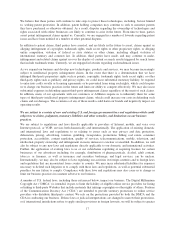Yahoo 2010 Annual Report Download - page 28
Download and view the complete annual report
Please find page 28 of the 2010 Yahoo annual report below. You can navigate through the pages in the report by either clicking on the pages listed below, or by using the keyword search tool below to find specific information within the annual report.business, there are many transactions and calculations where the ultimate tax determination is uncertain. We earn
a significant amount of our operating income from outside the U.S., and any repatriation of funds currently held
in foreign jurisdictions may result in higher effective tax rates for us. In the past there have been proposals to
change U.S. tax laws that could significantly impact how U.S. multinational corporations are taxed on foreign
earnings. We cannot predict the form or timing of potential legislative changes, but any newly enacted tax law
could have a material adverse impact on our tax expense and cash flow. We are subject to regular review and
audit by both domestic and foreign tax authorities as well as subject to the prospective and retrospective effects
of changing tax regulations and legislation. Although we believe our tax estimates are reasonable, the ultimate
tax outcome may materially differ from the tax amounts recorded in our consolidated financial statements and
may materially affect our income tax provision, net income, or cash flows in the period or periods for which such
determination and settlement is made.
Our stock price has been volatile historically and may continue to be volatile regardless of our operating
performance.
The trading price of our common stock has been and may continue to be subject to broad fluctuations. During the
year ended December 31, 2010, the closing sale price of our common stock on the NASDAQ Global Select
Market ranged from $13.11 to $18.97 per share and the closing sale price on February 18, 2011 was $17.66 per
share. Our stock price may fluctuate in response to a number of events and factors, such as variations in quarterly
operating results, announcements and implementations of technological innovations or new services by us or our
competitors; changes in financial estimates and recommendations by securities analysts; the operating and stock
price performance of other companies that investors may deem comparable to us; the operating performance of
companies in which we have an equity investment, including Yahoo Japan Corporation (“Yahoo Japan”) and
Alibaba Group Holding Limited (“Alibaba Group”); and news reports or rumors relating to us, trends in our
markets, or general economic conditions.
In addition, the stock market in general, and the market prices for Internet-related companies in particular, have
experienced volatility that often has been unrelated to the operating performance of such companies. These broad
market and industry fluctuations may adversely affect the price of our stock, regardless of our operating
performance. Volatility or a lack of positive performance in our stock price may adversely affect our ability to
retain key employees, all of whom have been granted stock options or other stock-based awards. A sustained
decline in our stock price and market capitalization could lead to an impairment charge of our long-lived assets.
Anti-takeover provisions could make it more difficult for a third-party to acquire us.
We have adopted a stockholder rights plan and initially declared a dividend distribution of one right for each
outstanding share of common stock to stockholders of record as of March 20, 2001. As a result of our
two-for-one stock split effective May 11, 2004, each share of common stock is now associated with one-half of
one right. Each right entitles the holder to purchase one unit consisting of one one-thousandth of a share of our
Series A Junior Participating Preferred Stock for $250 per unit. Under certain circumstances, if a person or group
acquires 15 percent or more of our outstanding common stock, holders of the rights (other than the person or
group triggering their exercise) will be able to purchase, in exchange for the $250 exercise price, shares of our
common stock or of any company into which we are merged having a value of $500. Because the rights may
substantially dilute the stock ownership of a person or group attempting to take us over without the approval of
our Board of Directors, our rights plan could make it more difficult for a third-party to acquire us (or a significant
percentage of our outstanding capital stock) without first negotiating with our Board of Directors regarding that
acquisition. The rights plan expires on March 1, 2011, and our Board of Directors does not currently intend to
renew the plan.
In addition, our Board of Directors has the authority to issue up to 10 million shares of Preferred Stock (of which
2 million shares have been designated as Series A Junior Participating Preferred Stock) and to determine the
price, rights, preferences, privileges and restrictions, including voting rights, of those shares without any further
vote or action by the stockholders.
26
























